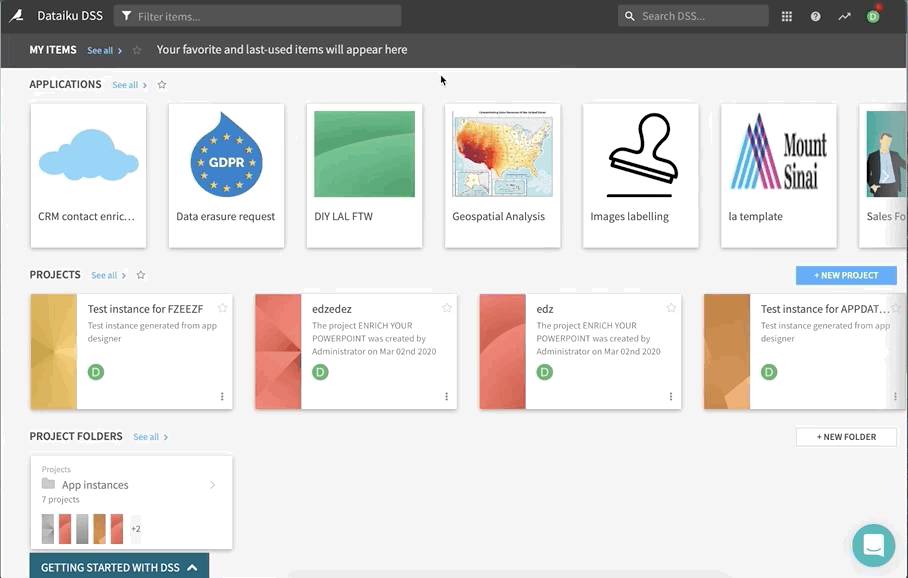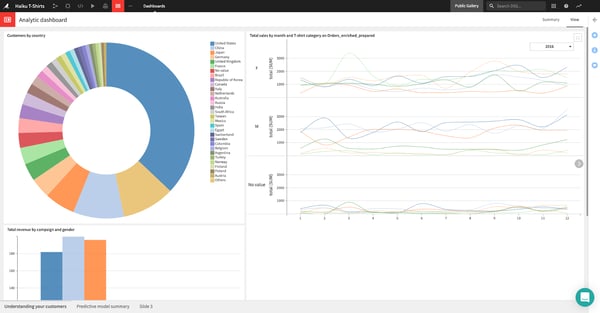You’ve spent hours on a data science project — poured your blood, sweat, and tears into making a model or analysis that you believe can save the company millions of dollars or bring in that extra revenue. But, then what? The insights might be given in a presentation or perhaps others see them and ask for the exact analysis for their region or product.
Well, Dataiku DSS 8.0 empowers you to bring your analysis to the masses in a transparent and explainable way. This article will focus on Dataiku applications, but stay tuned for additional blog posts that highlight even more features from Dataiku DSS 8.0!
Heads Up!
This blog post is about an older version of Dataiku. See what's new in the latest version.
First, Let’s Talk Self-Service Apps
Dataiku offers two types of applications but both have a similar concept of putting a user-friendly interface on top of a data science project so that anyone can get insights, easily. They don’t have to bother you to get the answers they need and you don’t have to worry about them messing around with the analysis and tying your name to some rogue analysis. There are Dataiku applications and web apps but we will start with the easiest ones to build — Dataiku applications.
Dataiku Applications
In any project, you can use the application designer to build an application to be used as a stand alone or an application as a recipe which can package up the project to be used in another larger project. In the application designer, you can give it a title, description, an image, and tags to make it easier to find. Users can choose from a variety of different actions to take including bringing their own data or typing in a customer number for a customized dashboard report.
Build your first Dataiku application with this walk-through on Dataiku Academy:

Dataiku Web Apps
Web apps provide more flexibility but require coding knowledge to create. You build both the front and back end and use an API to integrate into the Dataiku project. There are three types of web apps you can build — Standard, Shiny, and Bokeh apps. Standard web apps use HTML, CSS, and Javascript code in a Dataiku DSS web app editor and can access various Dataiku DSS APIs to fetch data from datasets. These standard web apps can also contain a Python back end to do even more through Python APIs.
For both Shiny and Bokeh web apps, you can easily create interactive web apps without the CSS or Javascript using the Shiny R or Bokeh Python library. Whether it’s a custom visualization or series of questions, web apps can deliver the flexibility you need to give everyone the power of AI. Learn how to build your first web app here.
A Picture Is Worth a Thousand Words
While a picture may be worth a thousand words, a chart or dashboard speak exponentially louder and bring the insight to life for stakeholders. A data point by itself may not mean much but often you aren’t able to always be there to present the data point. Let the data speak for itself with a chart that involves the visual senses and can effectively communicate the insight. Choose from over 25 different chart types or leverage code to create the pixel perfect customized visualization. Create a dashboard with a combination of charts, tables, web apps, metrics, wikis, and more to give the context needed for every data-driven insight.

If you’re a data expert, you can now create a business-friendly, code-free interface on top of any model or data science project for decision-makers to leverage insights everyday, allowing you to focus on your next big project while still empowering the business with continual insights. Conversely, if you’re a business leader, Dataiku applications allow you to use a self-service catalog of applications to set parameters based on your unique needs to get results and make results in a more agile way.





